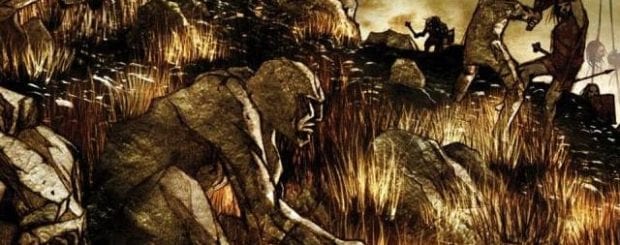Division of Eras
The corners are not a land to know peace for very long.Nearly all of the great peoples in the land had become great by their past military victories.
A state cannot exist without an army. Or an army without a state. One inevitably creates the other.Armies and bands of men rose with their principle and fell with their nations. This phenomenon had such a clear significance to everyone that eras were defined and organized by whichever was the largest military force of their time.
Mit'awi Chapaq abbreviated (M.C.)
(mit-awe cha-pac)Ancient kang armies were the only ones to have conquered all four corners of the world before the Innoit.
The long lost time-people whose fanciful exploitations have been the jealous inspirations for many songs and sonnets in the cultures of many would-be empires.
Nuna Ruruchina abbreviated (N.R.)
(nu-na ru-ru-chin-aa)Nuna Runa placed such great value in their magic that the only way to advance socially was through grand displays of skill.
So when their time came, there was no end to their waves of invasions. Even running out of conventionally beneficial targets of conquests. They then aimed against the lone peaks, Messas and single path hideouts of those who were none too important.
Nina Pillunya abbreviated (N.P.)
(ni-na pil-lun-ya)Dusky fire mages, even earth-bound, were powerful enough to repel and humble the Nuna Runa. They were able to create an exclusion zone around their traditional homeland, to which the Nuna forever feared to tread.
Munay Manqus abbreviated (M.M.)
(mu-nay man-kus)But the old bird would eventually spark only embers and be aset by barbaric raidersDhani hosts and holdout temples trouble the mountainous landscapes in the west and south. They'd first carted food and women, and then spoils and treasures for petty chiefs and kings to aggrandize themselves. Many great warriors and bad men were bred from this system, who then sort greener pastures elsewhere and a bleeding of the population.
Taytakura abbreviated (T)
(tay-ta-ku-ra)The priests and monks, who originated from Mud and Dhani traditions, trained in combat in the mountains, extorted land owners and attacked rival taytakura temples. They were known for some time to harass government officials, with a few still operating in the Sacsayhuamán and Huanacauri mountains for as long as anyone could remember.
Pacha
A span of 500 years that traditionally comes to an end with a pachakuti.Pachakuti
A tumultuous historical period marked by environmental changes that lead to people changing their ways of thinking to a higher elevation. It is a time of social progression and restoration of balance, harmony, and sustainability.Remove these ads. Join the Worldbuilders Guild









Comments